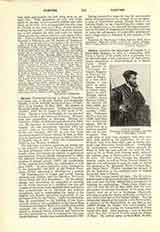

Cartier, GEORGES-ETIENNE, a French Canadian statesman, son of Jacques Cartier and Marguerite Paradis, b. at St. Antoine, on the Richelieu, September 16, 1814; d. in London, May 20, 1873. He studied at Montreal College (Sulpicians). During the Canadian rebellion (1837-38) he fought at the battle of St. Denis. Forced to cross the frontier, he was reported frozen to death in the forests of Vermont. He practiced law successfully in Montreal. Elected for Vercheres (1849), he followed Lafontaine and Baldwin, the founders of constitutional government in Canada. He was successively honored with important seats in the Cabinet. Under the Union of the two Canadas (1841-67) he was four times Attorney-General of Lower Canada: in 1856, in 1857, with the leadership of his province; in 1858 as Premier of Canada, and in 1864. After the Confederation (1867) he was Minister of Militia.
The following important measures are mostly due to his influence: the Grand Trunk Railway (1852); the final settlement (1854) of the seigniorial (feudal) tenure, which had become an obstacle to agriculture and industry; Victoria Bridge (inaugurated in 1860); the judiciary decentralization of Lower Canada; the creation of normal schools (1857); the modification of the criminal laws (1864); the codification of civil laws (1865). To avert legislative union, detrimental to the nationality and faith of the French Canadians, Cartier concurred in effecting—as a remedy—the Confederation of Upper and Lower Canada (Ontario and Quebec) with the Maritime Provinces (Nova Scotia and New Brunswick). By his ability, energy, and patriotism, he succeeded in securing for his native province as a condition sine qua non a degree of autonomy and a parliamentary representation proportionate to its historical and political importance, and in safeguarding the rights of the English and French minorities respectively in the provinces of the former Union. Under the Confederation, he contributed to the building of the Intercolonial Railway, the acquisition of the North-West Territories, framing for Manitoba a constitution which respected the rights of minorities. He likewise shared in drawing British Columbia and Vancouver into the Confederation, and in realizing the Canadian Pacific Railway. Cartier was created a baronet in 1868.
During twenty-five years he was the uncontested leader of his province in the struggle for equal rights. A man of indomitable energy, equally loyal to the Catholic Faith, to his French-Canadian origin, and to the British Crown, he directed his fellow-country-men in the path of progress and prosperity, assuring to them the advantages of responsible government and a large share of influence in the councils of the nation.
LIONEL LINDSAY

